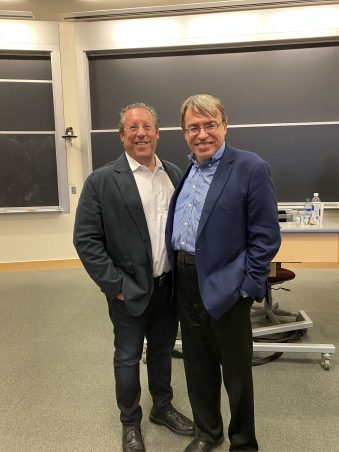 Dimitris Bertsimas and Barry Stein in the lecture theater at MIT-Sloan)
Dimitris Bertsimas and Barry Stein in the lecture theater at MIT-Sloan)
One of the biggest failures in the last decade in healthcare, has been the inability to integrate powerful Innovation into clinical workflows and healthcare operations.
At HHC we differentiate ourselves with our H3W model. Professor Bertsimas has witnessed this special culture in action over the last few years, and this January, invited Barry Stein, MD MBA FSIR FACR, HHC’s Chief Clinical Innovation Officer to lecture with him in his “Leadership using Quantitative and Qualitative Approaches” (LQ2) course in January 2020 for MIT-Sloan Executive MBA students and alumni from around the globe. The philosophy of the course is the following: Quantitative approaches are becoming increasingly important in organizations, as they are driving disruptions in the way business is carried on.
The class demonstrated how quantitative models can be important tools for leaders to implement changes in the culture and the political game within organizations through real world experiences. Participants had the opportunity to reflect directly on business cases in interaction with lecturers who actually led and implemented deep transformations involving quantitative approaches.
The class also focused on the complementarity of these quantitative approaches with traditionally, and necessary, qualitative ones. The Goals are the following: The class aims to show students using real world examples how organizations changed using analytics but also taking into account the human/cultural components. HHC@MIT: It provided a unique platform to showcase the impact of Hartford HealthCare’s special culture to allow transformative Innovation to be developed and then implemented.
(Picture 3: Barry Stein lecturing at MIT-Sloan on Leadership using Quantitative and Qualitative Approaches; Picture 4: Dimitris Bertsimas and Barry Stein in the lecture theater at MIT-Sloan)